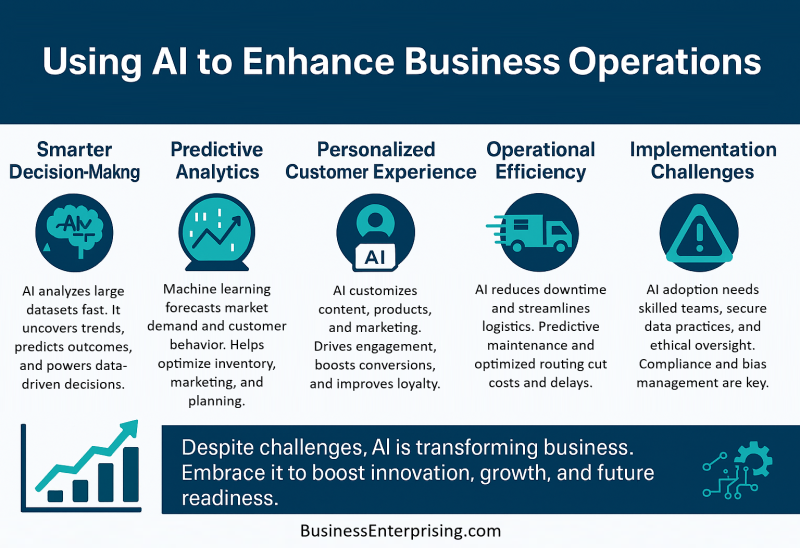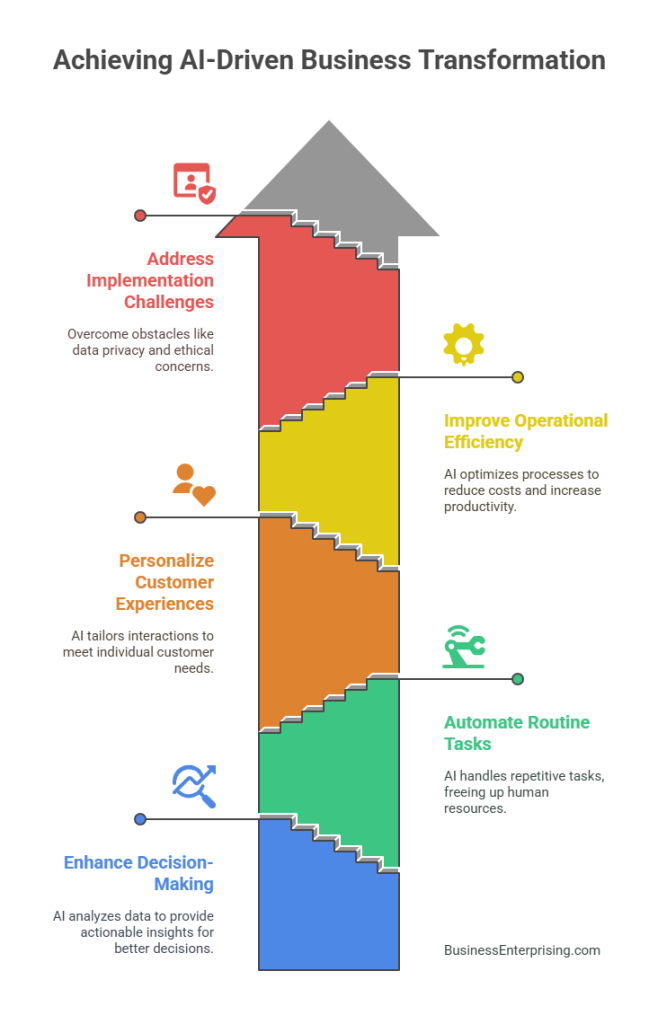![]() In today’s fast-paced and highly competitive business environment, staying ahead of the curve is imperative for success. Using AI to enhance business is becoming common practice and one of the greatest tools since the advent of the internet. From enhancing decision-making processes to automating mundane tasks, Artificial Intelligence has the potential to revolutionize the way companies operate.
In today’s fast-paced and highly competitive business environment, staying ahead of the curve is imperative for success. Using AI to enhance business is becoming common practice and one of the greatest tools since the advent of the internet. From enhancing decision-making processes to automating mundane tasks, Artificial Intelligence has the potential to revolutionize the way companies operate.
Using AI to Enhance Business is Changing How Companies Operate
Firstly, AI significantly enhances decision-making capabilities. Traditional data analysis methods often fall short when dealing with large volumes of complex data. However, AI-powered analytics can sift through vast amounts of data at unprecedented speeds, uncovering insights that were previously hidden. For instance, AI algorithms can analyze customer behavior patterns, predict future trends, and provide actionable insights, thereby enabling businesses to make data-driven decisions.
Moreover, AI’s predictive analytics capabilities allow companies to anticipate market trends and customer needs. By leveraging machine learning algorithms, businesses can forecast demand, optimize inventory, and tailor their marketing strategies accordingly. This not only improves efficiency but also enhances customer satisfaction by ensuring that products and services are readily available when needed.
Automating Routine Tasks
In addition to enhancing decision-making, AI plays a crucial role in automating routine tasks. Many business processes, such as data entry, customer support, and inventory management, involve repetitive tasks that can be time-consuming and prone to human error. AI-powered automation tools can handle these tasks with greater accuracy and efficiency. For example, chatbots powered by natural language processing (NLP) can handle customer inquiries 24/7, providing instant responses and freeing up human agents to focus on more complex issues.
Furthermore, robotic process automation (RPA) enables businesses to automate rule-based tasks across various applications. This not only reduces operational costs but also minimizes the risk of errors, thereby improving overall productivity. As a result, employees can redirect their efforts towards more strategic and value-added activities, driving innovation and growth.
Personalizing Customer Experiences
Another area where using ai to enhance business is making significant strides is in personalizing customer experiences. Today’s consumers expect personalized interactions and tailored recommendations. AI-driven solutions enable businesses to analyze customer data and deliver highly personalized experiences. For instance, recommendation engines, such as those used by e-commerce giants like Amazon and Netflix, leverage AI to suggest products and content based on individual preferences and past behavior.
Moreover, AI-powered marketing tools can segment customers based on various criteria, allowing businesses to create targeted campaigns that resonate with specific audiences. This not only enhances customer engagement but also drives higher conversion rates. Additionally, AI can optimize pricing strategies by analyzing market conditions, competitor pricing, and customer demand in real time, ensuring that businesses remain competitive.
Improving Operational Efficiency
Beyond personalizing customer experiences, AI also plays a pivotal role in improving operational efficiency. In manufacturing, AI-powered predictive maintenance systems can analyze data from sensors and identify potential equipment failures before they occur. This proactive approach minimizes downtime, reduces maintenance costs, and extends the lifespan of machinery.
Similarly, in supply chain management, AI algorithms can optimize logistics by analyzing variables such as traffic patterns, weather conditions, and demand fluctuations. This ensures timely deliveries, reduces transportation costs, and enhances overall supply chain efficiency. In fact, many logistics companies are already leveraging AI to streamline their operations and gain a competitive edge.
Addressing Challenges in AI Implementation
While the benefits of AI are undeniable, businesses must also navigate several challenges during its implementation. Firstly, integrating AI into existing systems can be complex and requires a significant investment in infrastructure and talent. Organizations must ensure that they have the necessary technical expertise to develop, deploy, and maintain AI solutions.
Secondly, data privacy and security concerns are paramount. AI systems rely on vast amounts of data to function effectively, and businesses must ensure that they comply with regulations such as the General Data Protection Regulation (GDPR). Implementing robust data governance frameworks and adopting best practices for data security is essential to mitigate risks.
Moreover, ethical considerations surrounding AI usage must not be overlooked. Businesses must ensure that their AI systems are transparent, fair, and free from biases. Developing ethical guidelines and conducting regular audits can help organizations address these concerns and build trust with stakeholders.
Conclusion
In conclusion, using AI to enhance business is proving to be a powerful way to boost the decision-making process, automate routine tasks, personalize customer experiences, and improving operational efficiency overall. While the journey to AI adoption comes with its set of challenges, the benefits far outweigh the hurdles. By investing in AI technologies and addressing the associated challenges, businesses can unlock new opportunities for growth and innovation. As AI continues to evolve, its potential to transform various aspects of business operations will only expand, making it an indispensable tool for future success.


